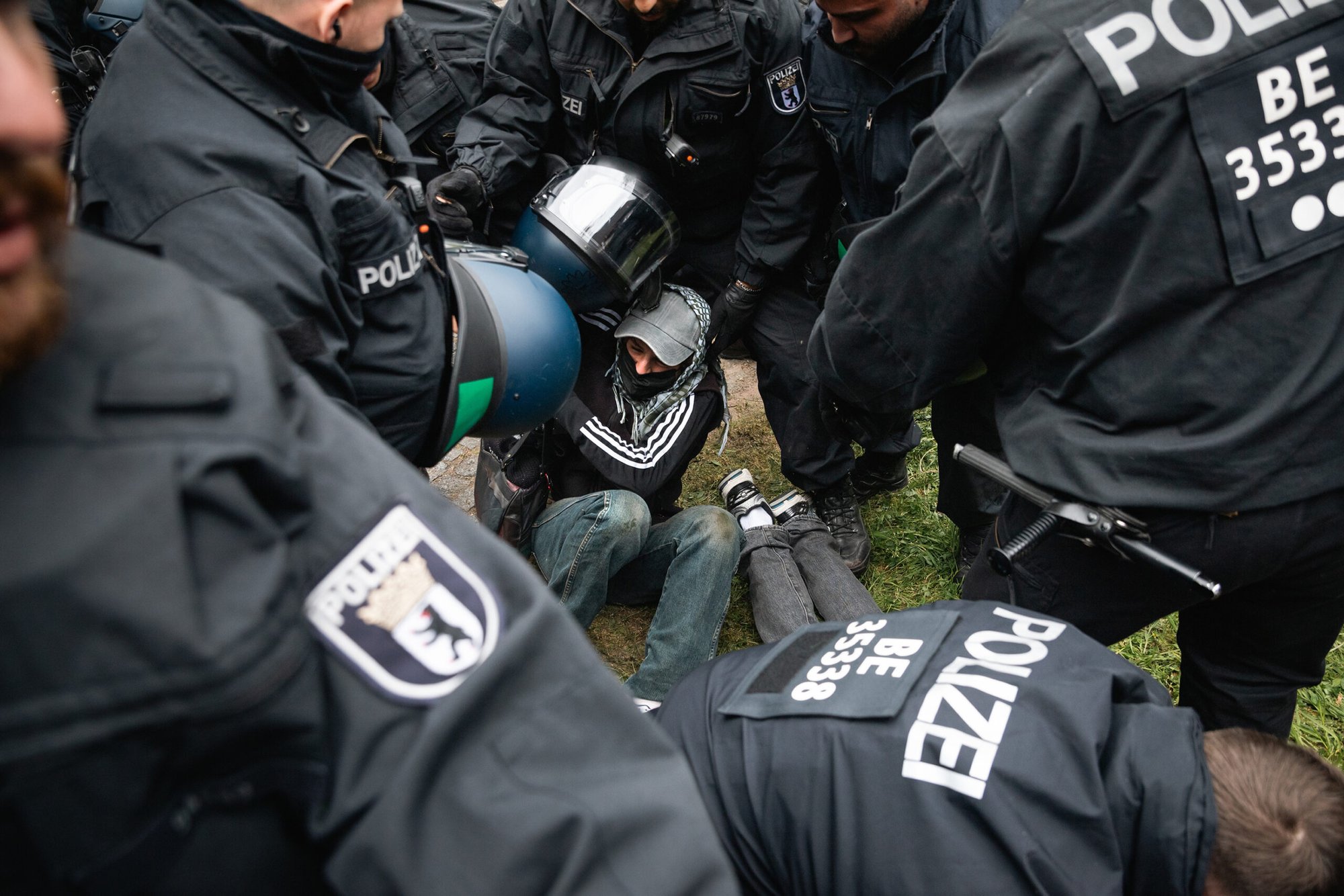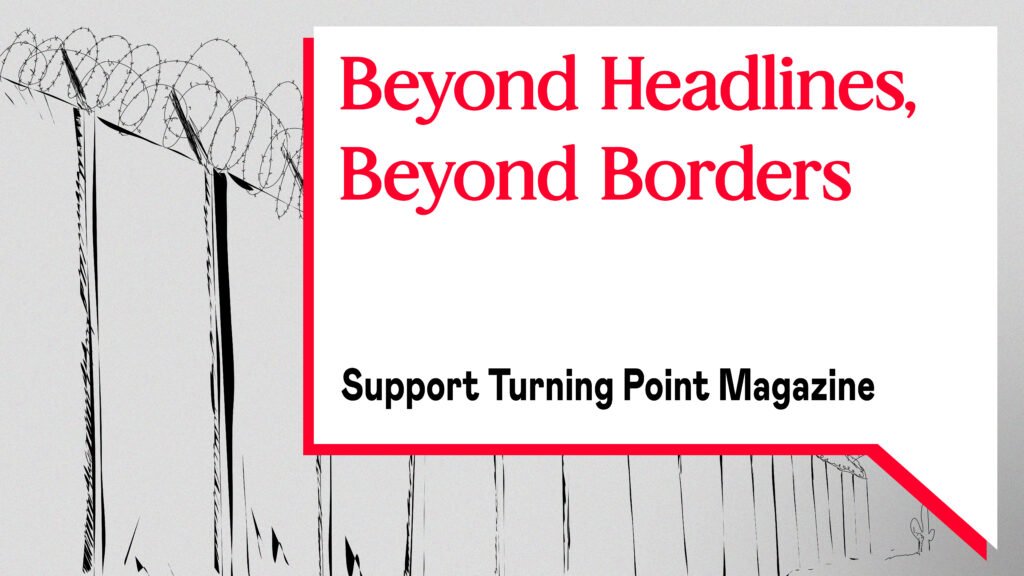Cover photo: Germany, Berlin, May 7, 2024. The pro-Palestinian camp and the protest at the “Freie Universität” in Berlin was violently evicted with the consent of the authorities of the educational institution. ©Montecruz Foto
On May 22, 2024, the air outside Berlin’s Humboldt University was thick with tension. Over a hundred people had peacefully gathered at Universitätsstraße in solidarity with a group of students. The students had occupied the nearby Institute for Social Sciences and renamed it Jabalia Institute after one of the largest refugee camps in Gaza—known as a historic stronghold of resistance. Their voices rose together in steady, rhythmic chants, demanding peace and justice for people facing genocide and violence in Palestine and Lebanon.
“When I first arrived, I was shocked by the amount of police on the street,” said Mimo, a 26-year-old engineering student at TU Berlin whose name has been changed due to his concern about possible visa issues and other legal problems that could result from his political views in Germany. Like many of his fellow students, Mimo is part of the Student Collective for Palestine at TU Berlin, an initiative committed to advocating for Palestinian rights and social justice. At Universitätsstraße, their calls for peace and equity were met with unyielding violence and hostility from the authorities.
“I can’t breathe anymore,” Mimo recalled himself gasping, as he felt a sharp, breath-stealing blow to his chest, before he even saw it coming. A police officer from the line had hit him with Quarzsandhandschuh—weighted gloves used to illegally harm protesters—forcing him to bend his knees from the pain while his fingers slipped out of the hands of those next to him.
As the human chain broke, the officers surged past him, dealing blows indiscriminately at the young faces around him. Cries of fear and pain erupted as the students scattered to escape the onslaught.
“It was really chaotic. People started crying and shouting like me: ‘I can’t breathe,’” Mimo recounted.
At the end of the day, Mimo returned home still shaken, his chest sore, and thoughts racing. Though he felt the lingering pain for weeks, he did not go to the hospital due to a fear of police retaliation. For Mimo and his fellow protesters, this was not an isolated experience but a part of an escalating pattern.
“The abuse of power from the authorities toward peaceful protesters is increasing exponentially,” Mimo explained. “We’ve started normalizing it.”
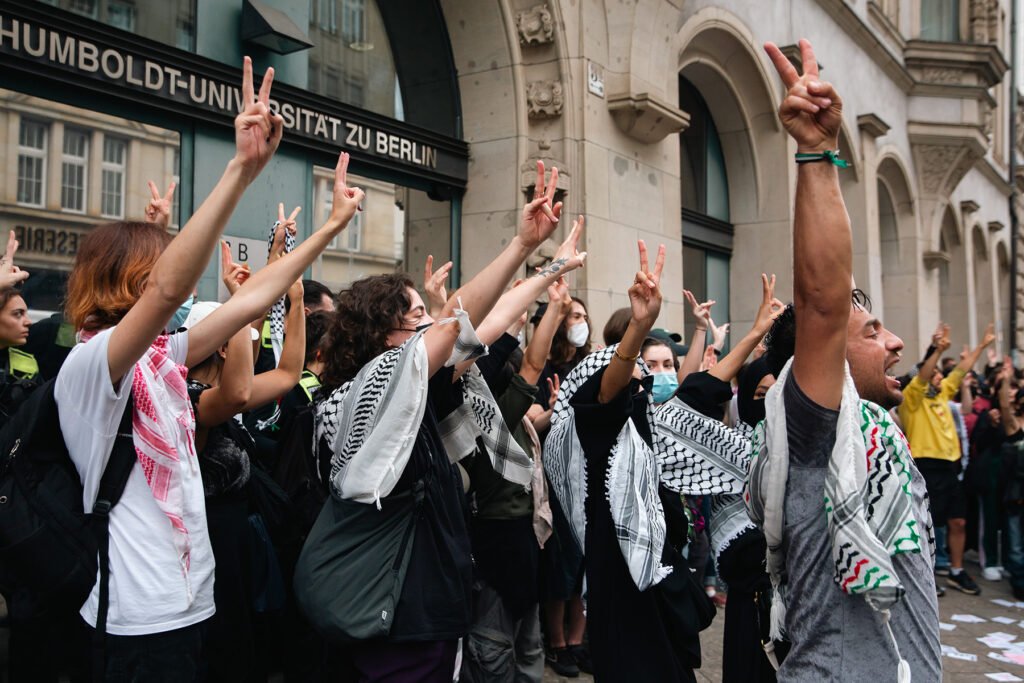
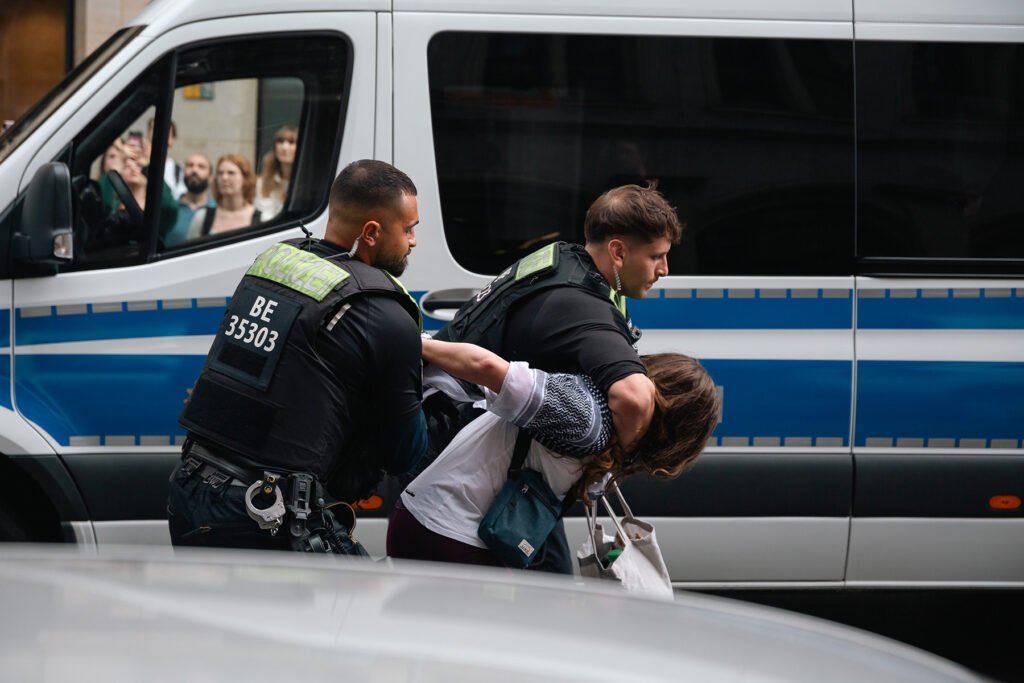
Mimo and the students in Berlin are not alone with their experience as governments and authorities across Germany and other European countries, including the United Kingdom, Italy, Spain, Poland, Hungary, and the Netherlands, are increasingly clamping down on civil society and student movements. Through new legal measures, intensified surveillance, and public media campaigns, the authorities actively stifle voices calling for peace, environmental justice, and human rights.
Over the last decade, Europe has witnessed an alarming rise in the repression and criminalization of activist groups and individuals; a trend that challenges the region’s formal commitment to democratic freedoms. A 2022 report from the European Civil Forum highlights this shift, recording over 450 cases of repression against civil society actors in Europe between 2019 and 2021.
A Shift Toward Criminalization and Its Legal Consequences
The criminalization of activist groups and NGOs across Europe carries significant legal and political ramifications. Members of organizations such as Sea Watch, Extinction Rebellion, Fridays for Future, and Last Generation have faced charges ranging from “public disturbance” to “aiding illegal immigration,” often under laws meant to protect state security or border integrity.
This crackdown risks undermining both the right to peaceful protest and a range of humanitarian practices protected under international human rights laws, including the European Convention on Human Rights. The legal consequences of the continent-wide trend extend beyond individual cases, creating a climate of fear and suppressing vital democratic freedoms—as seen in recent high-profile cases, especially in Germany, the UK, and Italy.
On May 19, 2023, during a high-stakes match at the Internazionali BNL d’Italia in Rome, the 33-year-old Last Generation activist Giacomo Baggio burst onto the court, throwing a vibrant cloud of confetti into the air in a courageous act of civil disobedience. The spectators watched, frozen, as the stadium security quickly moved in to forcefully remove the activist from the ground, their hands gripping his neck. As Baggio was dragged away, his message resonated beyond the arena: it did not just interrupt a tennis match, it broke public silence on the urgent climate crisis.
In the wake of this and other peaceful civil disobedience actions carried out by Last Generation, the Rome police have sought to place Baggio under special surveillance (sorveglianza speciale), a strict surveillance regime devised for members of organized crime. For Baggio, it meant daily check-ins, an 8 p.m. curfew, and a ban on public events, sharply curtailing his political and social life.
“In the beginning, I felt profoundly alone,” Baggio shared. “This measure targeted me as an individual, isolating me from society.”
His words reflect the experiences of many European activists who face heightened repression as authorities use surveillance, arrests, and intimidation to silence dissent. In mid-October 2024, the Rome court overturned the surveillance request, citing insufficient evidence for a public threat. Yet, the chill on civil freedoms lingers as a warning for organizers across Italy and Europe.
“These disproportionate repressive acts show that the government fears losing legitimacy, clinging to power by silencing those who hold up a mirror to what it doesn’t want to see,” said Baggio.
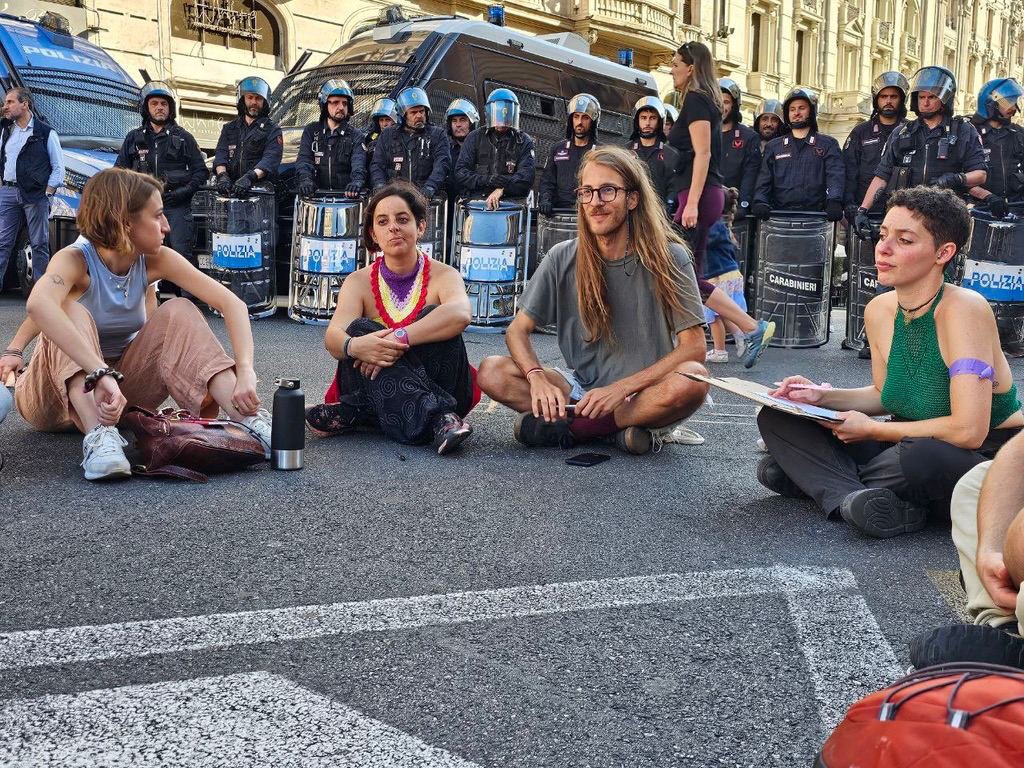
The repression of Last Generation has intensified far beyond Italy’s borders. In May 2023, the German authorities launched sweeping nationwide raids against the climate group, charging its members with forming or supporting a criminal organization—a grave accusation usually reserved for terrorism cases. According to the activists and local media reports, the crackdown involved shutting down the organization’s website, freezing its members’ bank accounts, and invasive home raids to temporarily confiscate their personal belongings. The wave of criminalization underscored a troubling escalation of power abuse against activists that targets and undermines not only their political and organizational capacity, but also their very sense of personal space, financial stability, security, and livelihood.
In its 2023 report on civic repression, Amnesty International documented a sharp rise in counter-terrorism measures targeting civil society across Europe. Since 2019, at least 2,000 Extinction Rebellion (XR) activists have faced legal action, many for peaceful acts like roadblocks or sit-ins, with some even charged with terrorism-related offences. The UK’s 2022 Police, Crime, Sentencing, and Courts Act intensifies this crackdown, granting the police broad authority and imposing severe penalties on protests deemed “disruptive.“ Roadblocks and business disruptions now carry severe legal risks and consequences for groups like XR.
“In England and Wales, prison sentences for climate activists have surged dramatically,” said Charlie Holt, the European Head of Global Climate Legal Defence (CliDef). “Just a few years ago, it was rare to see climate activists jailed…now it happens routinely, and the sentences are growing longer and longer.”
In Spain, the Public Security Law—commonly known as the “gag law”—has been used against activists under vague claims of endangering national security. In 2022 and 2023, pacifist groups such as Desarma Madrid, which protested Spain’s arms sales, faced fines and arrests for unlicensed demonstrations.
The European Center for Not-for-Profit Law (ECNL) highlights similar legal restrictions across Poland, Italy, and Hungary. In Hungary, the far-reaching “Stop Soros” legislation specifically targets organizations providing aid to migrants and a range of other legitimate migration-related activities; making them punishable by up to one year in prison. The law has led to a significant chilling effect on the work of humanitarian groups. Although the EU Court rejected this law, the government has yet to retract it.
In Poland, the 2022 amendments to public assembly laws have drastically curtailed protest rights, empowering authorities to shut down peaceful gatherings without substantial evidence. This has impacted protests—particularly those since the 2022 Russian full-scale invasion in Ukraine—where demonstrators have rallied for peace and women’s rights while criticizing cuts to social welfare made in favour of military spending. On March 8, 2023, several protesters were detained on public order charges as feminist groups, including Strajk Kobiet, protested in Warsaw on the International Women’s Day.
Similarly in Italy, in September 2024, the parliament’s lower house approved a new Security Bill that targets climate activists and migrants in particular, while bearing consequences for a range of non-governmental organizations such as labor unions. If the decree also passes the Senate, protesters who block roads or railways could face up to two years in prison, while authorities would gain sweeping powers over migrants in detention centers.
The Security Bill mirrors a decade-long European trend of framing solidarity with migrants as a security threat rather than humanitarian aid. Civic Space Watch reports that a growing number of NGOs and individuals across Europe now face prosecution for offering food, shelter, or legal assistance to migrants accused of “aiding illegal immigration.”
“Authorities are trying to intimidate, hinder, and criminalize us to deter our rescue efforts and humanitarian actions,” said Oliver Kulikowski, the spokesperson of Sea Watch, a Mediterranean search-and-rescue NGO. He noted that Sea-Watch has faced hefty fines, legal battles, and that activists are threatened with prison terms for their life-saving work in one of the biggest graveyards in the world—the Mediterranean Sea.
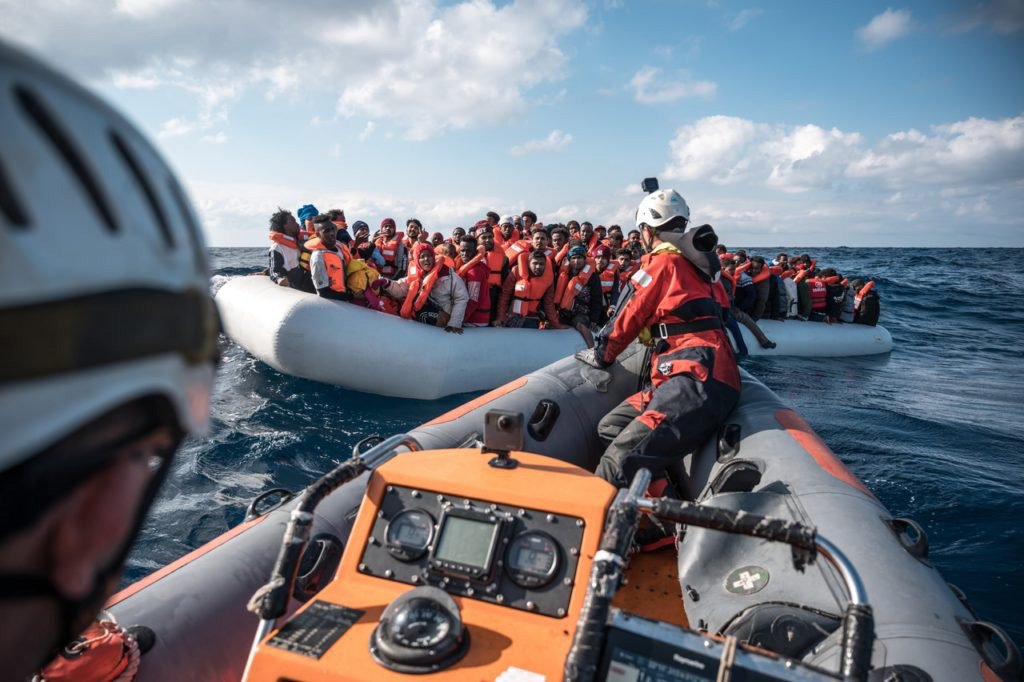
“This repression leads to an increasingly repressive society,” added Kulikowski. “When we see and allow people to die without rights at our borders, we erode the humanity and rights of society as a whole.”
In February 2024, the Council of Europe’s Commissioner for Human Rights urged an end to the repression of human rights defenders assisting migrants in Europe. The commissioner warned that criminalizing rescue operations violates the UN Convention on the Law of the Sea, which mandates aid for those in distress and raises ethical concerns about the responsibility of European nation-states to protect human life.
The repression has intensified in tandem with a surge in populist movements that frame humanitarian aid as subversive and illegal. For activists, NGOs, and civil society, mounting restrictions underscore a stark truth: defending human rights increasingly means sacrificing personal freedom as states prioritize border control over humanitarian commitments. The crackdown raises urgent questions about the EU’s commitment to its legal principles and core values in an era of escalating populism.
The Rise of Populism, Media Stigmatization, and Polarisation
In 2024, Amnesty International’s report on the state of the right to protest across 21 European countries highlighted a growing trend in repressive legislation, arbitrary arrests, the use of excessive force, and the rise of invasive surveillance.
“Rather than solving the problems they claim to want to prevent and repress, these punitive norms have the sole effect of feeding public opinion with new criminal hypotheses, further sanctions, and increases in existing penalties. Criminal populism, in short,” said Vitalba Azzollini, an Italian lawyer, about Italy’s recent Security Bill. Part of a broader right-wing wave across Europe, these measures disproportionately target migrant aid organizations, environmental activists, and peace advocates, fuelling campaigns that depict dissent as a destabilizing force.
“These narratives, often promoted in the name of protection of national security, state sovereignty, and moral values, are in fact being used to silence and repress dissent, public activism, and political participation,” said Gina Romero, the UN Special Rapporteur on the rights to freedom of peaceful assembly and association in her report presented to the UN General Assembly in October 2024.
A 2022 study by Frontiers in Communication revealed how populist politicians have used mainstream media to amplify fear by spreading emotional narratives that sway public perception of activists as threats to stability and national security.
Political organizations calling for climate justice and social change often face an onslaught of populist media labels—“eco-vandals,” “extremists,” “criminals”—to weaponize public opinion towards them, noted Romain Didi, the Climate Governance and Human Rights Policy Coordinator of CAN Europe. This tactic, he explained, seeks to polarize society by focusing outrage on disrupted commutes and cultural damage, rather than the urgent reasons behind the activists’ actions.
Polls reveal a complex public sentiment about the increased criminalization of activist groups across Europe. For example, a survey conducted by More in Common Germany found that public support for radical climate actions has halved since 2021, with 55% of respondents now believing the protests are too disruptive. At the same time, support for climate action remains high, with 70% of Germans agreeing that addressing climate change requires urgent measures.
As restrictive laws advance under populist political forces that put the right to peaceful protest at risk, the media has taken an active role in polarizing public perceptions of social movements. This media strategy therefore increases public acceptance of restrictive measures, normalizing crackdowns, and, ultimately, contributing to the erosion of civil society and democratic values.
The Consequences of Repression
In 2022, Amnesty International launched the Protect the Protest campaign to address the alarming increase in government repression, criminalization of dissent, and the use of excessive force against peaceful demonstrators worldwide. The campaign aims to defend and uphold the freedoms of expression, assembly, and association while advocating for the fundamental right to protest and call for peace. The Council of Europe has also warned that the escalating criminalization of non-violent protests poses a direct threat to free speech and peaceful assembly.
Notably, the United Nations has urged governments to protect young climate and social justice activists, emphasizing their crucial role in addressing the global climate crisis and fight for social justice and peace:
“Activists are like a fire alarm for society: essential and life-saving, even if uncomfortable to hear,” remarked Ben Mitchel, an XR protester who participated in several peaceful actions in the UK.
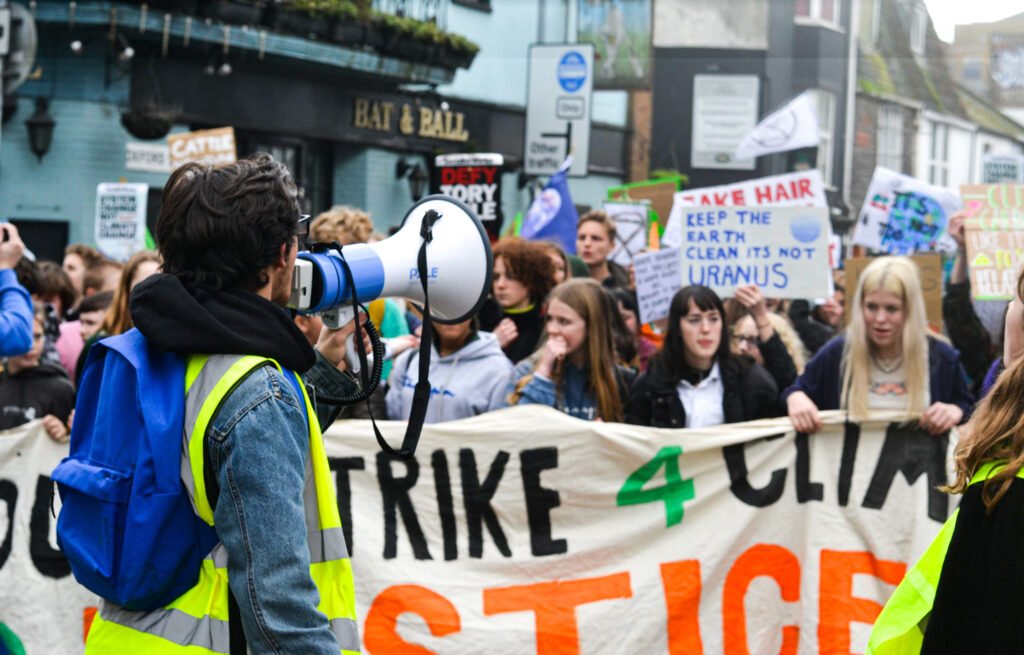
Experts affirm that the rising trend of criminalizing social justice movements and their participants—fuelled by populist rhetoric—often has opposite affects. Rather than discouraging political participation, these repressive measures tend to amplify public support and drive even more activists to the streets, underscoring the urgency of their causes.
Nottingham Trent University lecturer Heather Alberro notes that heavy-handed responses can radicalize movements in what experts call the “radical flank effect,”where activists adopt more extreme tactics as repression intensifies.
Alberro explains that repression often pushes activists toward more radical actions, creating a dangerous cycle that may jeopardize movement goals and political stability. The pattern of criminalization and radicalization undermines public trust in democratic institutions, at the same time intensifying solidarity among the targeted activists and communities. We see this echoed in movements like Black Lives Matter, pro-Palestine advocacy, and Extinction Rebellion, where greater unity and resistance has been sparked in the face of state repression. According to Alberro, the result is a fragile balance where governments’ restrictive measures risk deepening societal divides, highlighting the need for European states to strike a fairer balance between security and human rights.
“The more they try to silence us, the more determined we become…we are not backing down; we’re finding new ways to make our voices heard”, affirmed Mimo, his voice steady with resolve.
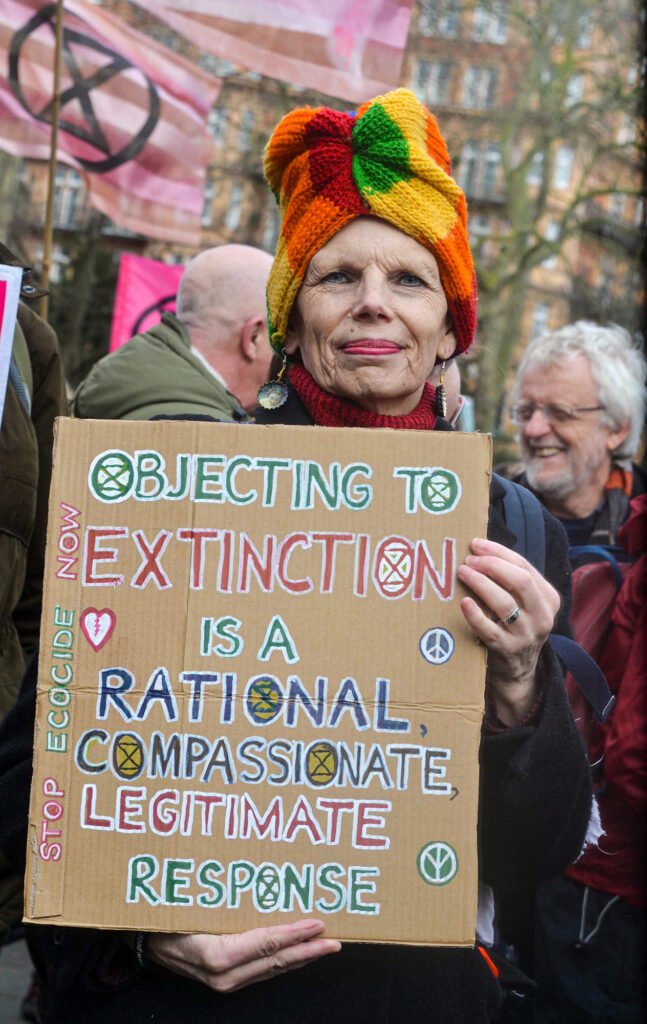
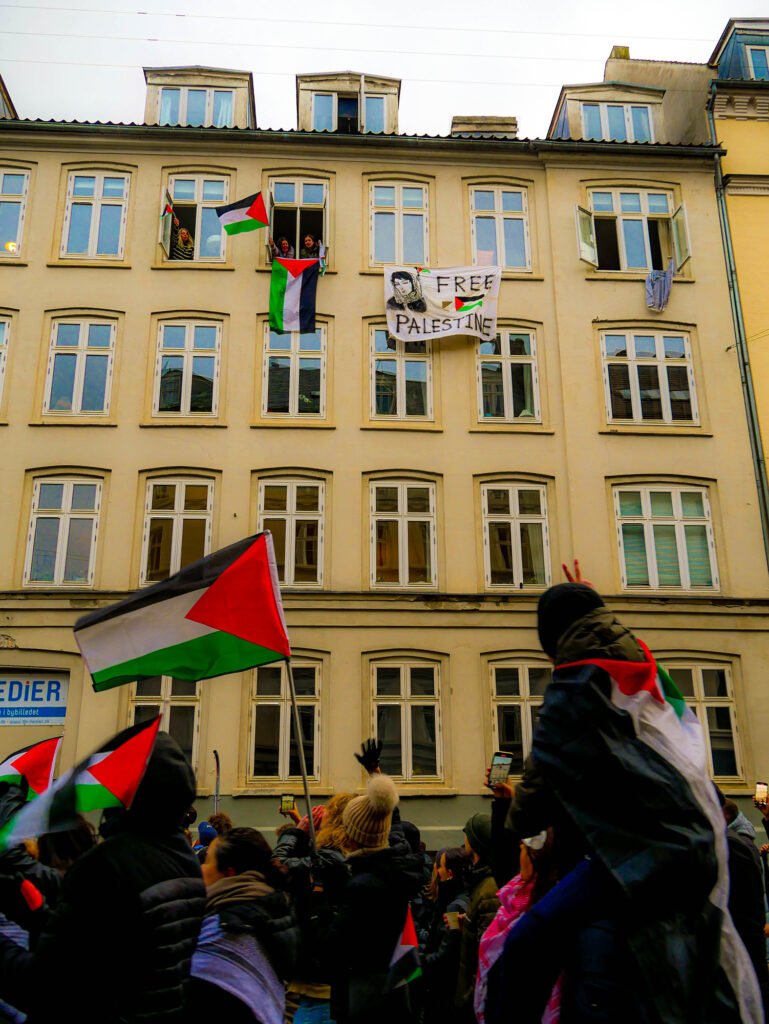
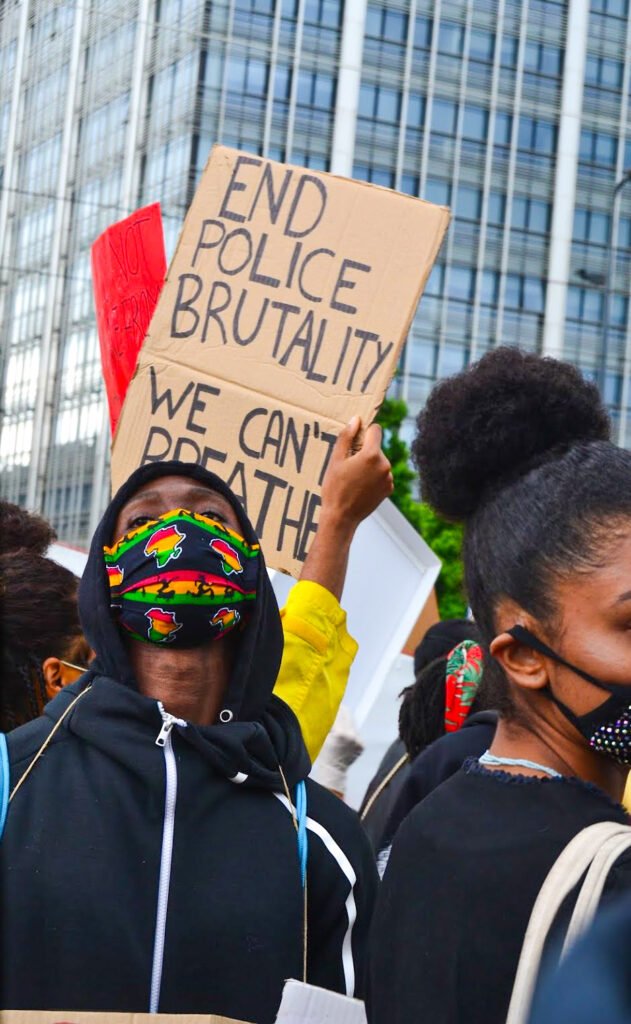
Looking Forward: A Turning Point?
As Europe steps into a pivotal decade—one defined by the need for urgent climate action, migration challenges, and rising geopolitical tensions—the criminalization and repression of social justice and peace advocates raise profound questions about how governments maintain public order while respecting civil liberties. With 64 countries going through elections this year, questions on fundamental rights have become one of the key battlegrounds worldwide.
In Europe, the constitutional rights that once defined liberal democracy—the freedom of assembly and speech, and the right to dissent—are threatened as governments increasingly turn to restrictive laws that target civil disobedience, dissent, and protest actions. These measures reshape Europe’s societal landscape, systematically eroding the right to peaceful protest and undermining citizens’ fundamental freedoms.
“Peaceful protest is essential to democracy; it’s the hope for future social progress. Politicians who oppose this prioritise their immediate interests over the community’s future,” said Baggio. His statement reflects a widespread call among activists and organizations for European governments to protect the rights to protest and free speech, ensuring a public space where diverse voices can engage with critical issues like climate justice, gender equality, social inclusion, and peace.
As authorities clamp down, grassroots groups and NGOs remain resilient and interconnected in building solidarity networks across borders to amplify their demands and unify their struggles. Solidarity, in this climate, is not only a strategy but a necessity to safeguard everyone’s fundamental rights.
“Solidarity means recognising that our struggles are linked and that the forces that try to silence us are often the same,” said Mimo with a spark of hope flickering in his eyes.“I fear the future, yes, but I also believe in the power of our voices to change it.”
For an EU that champions human rights, democracy, and peace, the escalating crackdown on civil society casts a sharp, unsettling shadow. This shift is more than just a legal tightening: it is a warning and a call to critically scrutinize the power dynamics that allow authorities and governments to exclude, stigmatize, and repress civil society. Criminalization of protest raises urgent questions about our freedoms to voice, organize, and defend the values of peace and justice we believe in—freedoms that are not only our rights, but our collective responsibility: to protect the future of the world in which we live.
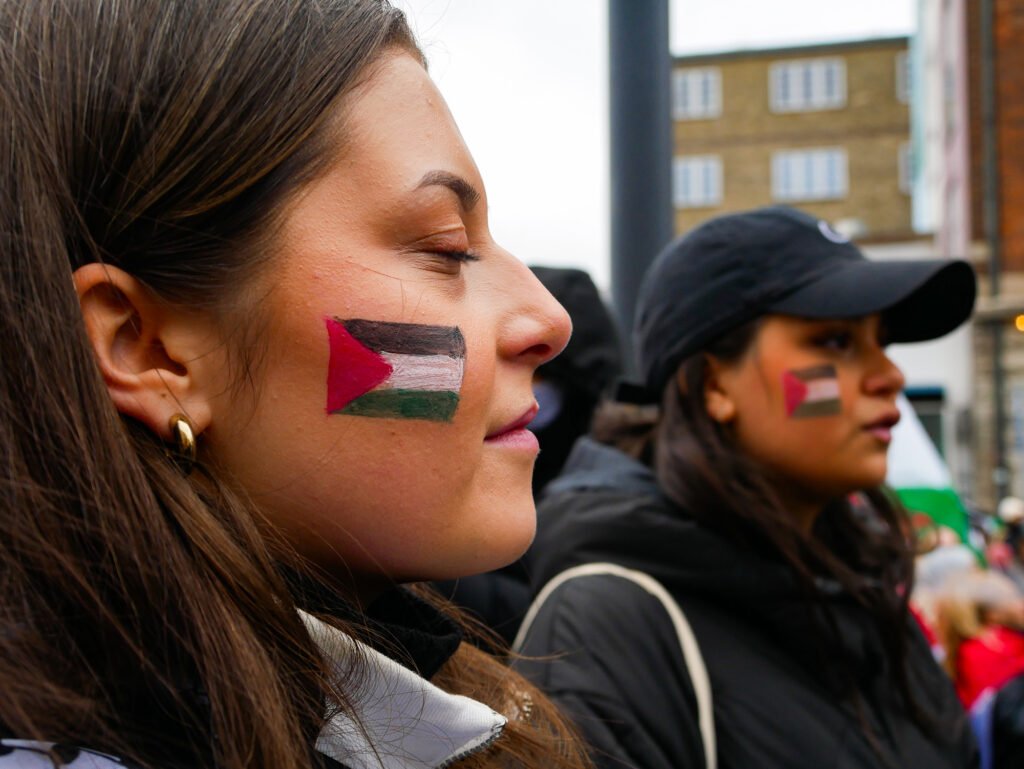

Gaia Guatri
Gaia Guatri is an independent photojournalist and documentarian specializing in gender inequality, migration, and social justice, with a background in anthropology and international relations. She reports across Europe, China, and Southeast Asia. She collaborates with global media outlets like The Copenhagen Post, Weave News, and Pangyao Magazine to amplify local voices and bring human-centred stories to international audiences.
